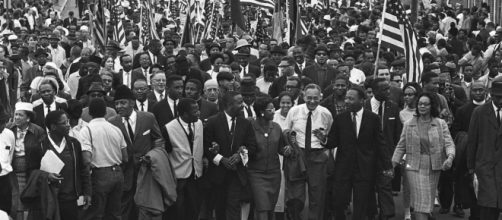Growing up, I've been fortunate enough to have been exempt from being a victim of prejudice and racism.
In my honors classes, there was a handful of African-American students, and we were looked at as the golden members of our race. Many of our classmates respected us, though we did get questionable glances and eyerolls from those of our color. We were scholars, but we were "oreos".
I remember lots of my classmates didn't know how to talk to us, because we stood out from their expectations of how black people usually behave, but they loved making references and assumptions of black culture regardless.
One day, a guy asked me if I listened to a certain rap artist's new album. When I told him I wasn't sure of who he was referring to, he casually said "That's my n*gga! You should check him out!"
It wasn't said in a menacing or spiteful way, but it still made me feel uncomfortable. Why did he feel okay using that word with me?
They're comfortable, we aren't.
This experience enough has stuck with me in such a negative way, so I can't even imagine how someone who has experienced direct, blatant racism would feel. I wanted to talk to someone about what had happened and why it made me feel so annoyed, so I know others would want the same comfort. Though I didn't want actions taken against him in a punishment, others may feel the need to have that option.
That is why the education department needs to continue its efforts in investigating Civil Rights cases at public schools.
Things have been steadily getting more and more out of hand. Students are getting shamed and suspended for how they wear their hair. This needs to be investigated by the department; why is this discrimination being allowed?
Why wouldn't we continue investigating the way we have?
According to Candice E. Jackson, acting head of the department's office for civil rights, regional offices will not have to report to the department officials in Washington about complaints such as "disproportionate disciplining of minority students and the mishandling of sexual assaults on college campuses".
It can be taken seriously when it comes to celebrities like Bill Cosby, who has lost many honorary degrees awarded by colleges, but those very same colleges won't even fight to bring justice to their students.
Obviously, the education department needs a lesson on humanity and morality.
President Trump wants to cut funding for the education system as well. It seems as though this country has lost value in one of the main foundations.
It was said that they will cut down on these investigations because since the new policy under the Obama Administration was administered, it has caused an increase in issues being reported and has delayed the amount they are able to respond to. It's about being able to better provide justice.
However, if we aren't going to take the complaints about harsh minority discipline and the issue of sexual assaults not being properly dealt with, that's more of a problem than being bogged down with complaints.
If we educated students more often and properly about other cultures, the amount of civil rights cases may decrease because people would know how to act civil toward each other.
Their protocol isn't about fixing the issues as much as fixing the issues quickly; to us, immediate results would be nice in fixing the stigma against black and brown people. However, this fight has gone on through many generations, and we will not forget or back down in these situations of injustice the department wants to "hurry through".
Justice is not to be rushed, it is to be served. So serve it well.


